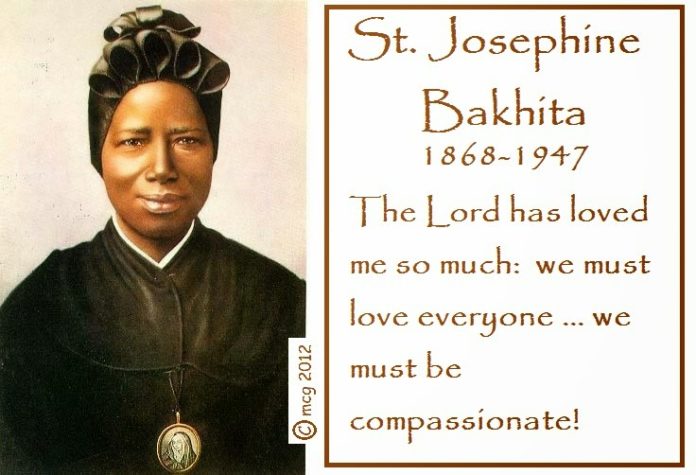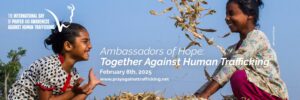The International Day of Prayer and Awareness Against Human Trafficking takes place every year on February 8th and coincides with the feast of St. Josephine Bakhita, a Sudanese nun who as a child was a victim of human trafficking. Born in Darfur, Sudan in 1869 she was kidnapped at the age of seven, she was sold and resold in the markets of El Obeid and Khartoum. Over the following thirteen years, we are told that she experienced all the humiliations, sufferings and deprivations of slavery. She was canonised by Pope John Paul II on the 1st of October 2000 and she is now the patron Saint of all those who suffer from the violence of human trafficking and became the universal symbol of the Church’s commitment against trafficking. To view a short video, made by the OLA and SMA, about the life of St Josephine Bakhita click on this link https://youtu.be/vMdIAc7C0Eo
On this day we are asked to do a number of things. To pray for the victims, to be aware of this issue and to help raise awareness among others of the reality of this terrible crime that is present in every country in the world. It is estimated that 50 million human beings are abused and exploited through human trafficking. We are of course also called to act or contribute in any way that we can to end the suffering and injustice that human trafficking causes.
 Theme for 2025: Ambassadors of Hope – Together Against Human Trafficking
Theme for 2025: Ambassadors of Hope – Together Against Human Trafficking
This year’s Day of Prayer closely reflects the Pilgrims of Hope theme of Jubilee Year 2025. As pilgrims, we embody a journey of transformation; and in this Jubilee year, we embrace the call to restore justice, bring freedom to those bound by oppression, and stand with the most vulnerable. On this day we focus particularly on the millions of people unjustly enslaved through human trafficking. We are all called to be ambassadors of hope and though our actions to transform lives with compassion and create a world free from human trafficking.
Traffickers operate in situations of vulnerability: they target people who desire a better life, to improve their own financial situation, to develop their abilities and skills, or simply to find a safe living environment. There are powerful connections between human trafficking, forced migration, and climate change. Many people are driven from their homes by war and conflicts, drought, rising sea levels and storms, things we are seeing more and more of in recent times. This increased vulnerability is placing people at greater risk of exploitation and trafficking.
According to the UN Office on Drugs and Crime, 72% of people exploited through human trafficking are women and girls. There are many forms of human trafficking including sexual exploitation, labour exploitation, and illegal organ removal. When it comes to sex trafficking, females make up an even higher percentage of victims.
Human trafficking is a highly profitable illegal business. $150.2 billion are the annual profits made from human trafficking in the world, two thirds of which derive from sexual exploitation. $34,800 are the annual profits per victim of trafficking in advanced economies, $15,000 in the Middle East, $7,500 in Latin America and the Caribbean, $5,000 in Asia Pacific, and $3,900 in Africa. 50% of exploited workers carry out forced labour to pay off a debt (Profits and Poverty: The Economics of Forced Labour , International Labour Organization, 2014).
There exists a form of structural injustice in the dominant model of neo-liberal development and unfettered capitalism which creates situations of vulnerability that are exploited by recruiters, traffickers, employers, and buyers (Talitha Kum General Assembly, 2019). This unjust economic model prioritizes profit over human rights, creates a culture of violence and commodification, and decreases funding for necessary social services, putting people at greater risk of being trafficked. This also affects programs of prevention, protection, support, integration and reintegration of trafficked people. As a form of structural injustice, this is an economic and increasingly a political cause that goes beyond the individual level and involves systems of oppression and exploitation.
Legal migration pathways have shrunk globally, including in cases of forced displacement, reducing the possibility for individuals to travel through safe channels. Individuals are increasingly prevented from accessing opportunities for human security and human development abroad. This approach – often paired with political rhetoric fomenting hate, racism and xenophobia – hinders the safety, dignity, human rights and fundamental freedoms of migrants, asylum seekers and refugees, including victims of trafficking and other vulnerable groups.
PRAYER
God of Mercy and Justice, as we walk this path, we remember that each step brings us closer to You and to our call to be Ambassadors of Hope. In this Jubilee, we lift up those impacted by trafficking, migration, and climate instability. We pray for freedom for the oppressed, courage for the journey, and healing for all who have suffered. Guide our steps to be ones of compassion, courage, and steadfast purpose. May our lives reflect a Jubilee spirit that restores, renews, and honours the dignity of all. We journey together, united in faith, and ask for Your guidance and grace to be with us each step of the way. Amen.
Source: The information above is taken mostly from https://preghieracontrotratta.org/


